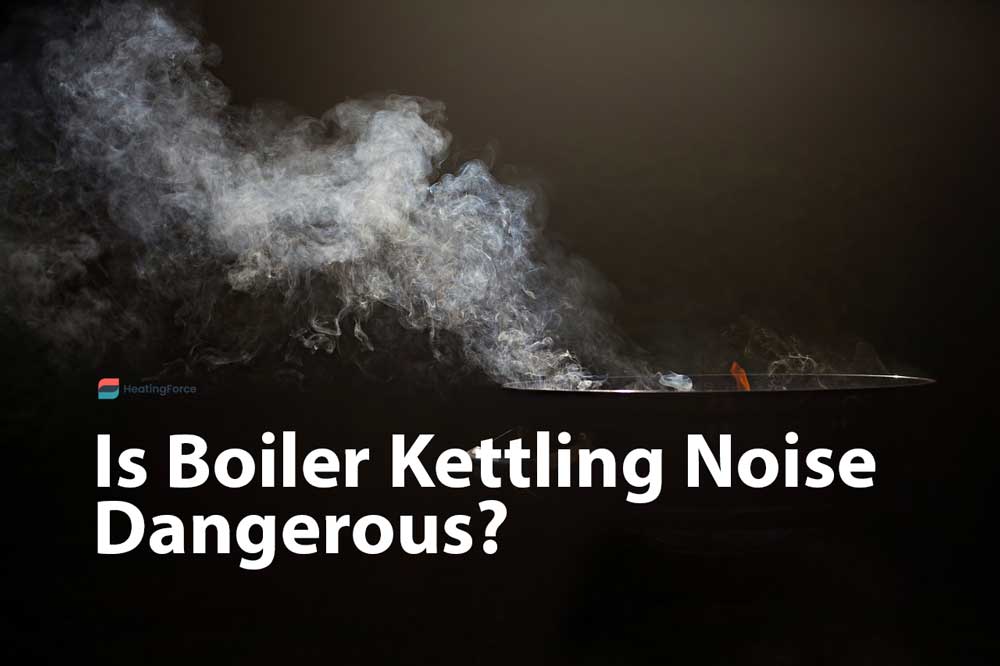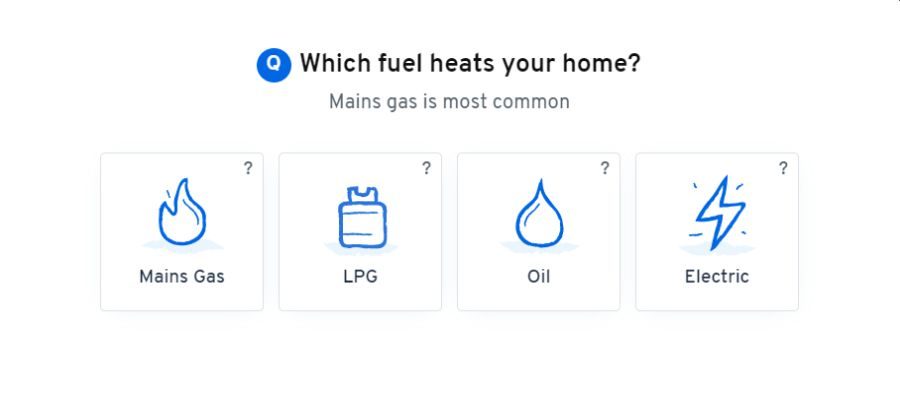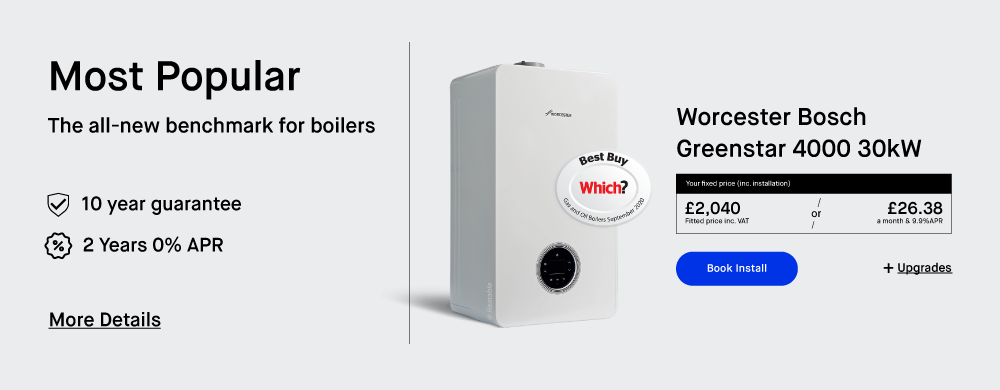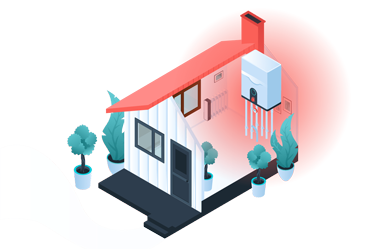Boiler Kettling Noise: Is it Dangerous? What Causes Kettling In a Boiler?
Is your boiler making noise? Are the noises routine, or signs of hidden faults? In this post, we will talk about boiler kettling — something most boilers go through thanks to hard water and sludge buildup.

Kettling sounds in a boiler may not be dangerous, but as with any fault, the longer you wait to fix it the more you’ll pay. Read on to find out more.
What Is Boiler Kettling?
Boilers, especially the newer combi models, can make a wide variety of noises as they switch on to heat water. Not all point to kettling though, and many are natural. So, before we dive into the causes and solutions of this problem, let’s define what kettling is.
“Kettling” occurs when the water inside a heat exchanger boils when it’s not meant to. That’s right – despite their name, boilers are not supposed to bring water to the 100C boiling point. At best, the water leaving a heat exchanger would be around 70C before it mixes with the cold mains water and cools off to the 50C domestic hot water (DHW) you get from your taps.
Boiler Kettling Noise
When water boils in the heat exchanger, it expands and turns to steam, building pressure within the pipes. The resultant boiler kettling noise may sound akin to a kettle boiling (hence the name) and is known to include whistling, rattling, banging and rumbling.
As we’ve pointed out before, boilers make a range of perfectly routine noises. For instance, you may hear the following, normal boiler noise:
- Clicking – that’s typically the switch telling the boiler that there’s a demand for hot water. This may happen when you adjust your thermostat setting, or when you simply turn on a hot water tap.
- Whirring – this is the sound of the pump that circulates water through the central heat system.
If you have a heat-only boiler and your central heating system starts making weird sounds, it’s possible that the feed and expansion tank may be dry, and sucking air into the pipework. To rule this out, run up to the loft (where feed and expansion tanks are typically kept), and see if the ball valve has jammed in the top position. It should drop automatically with the water level, and if it doesn’t, the tank will stop getting water and ultimately dry out.
If you’ve had your boiler for a while, you’ll know which sounds belong to its regular operating cycle. What’s key to catching problems early on is to watch out for unfamiliar sounds that emerge out of the blue or develop over time.
So, if you hear your boiler whistling like a kettle or rumbling, chances it’s boiler kettling noise. Boiler banging noise may also point to kettling.
What kind of fuel does your boiler use?
Fixed price online with next day installation
What Causes Boiler Kettling?
Now we know what kettling is: water reaching the boiling point when it shouldn’t be anywhere near it. This fault occurs for several reasons, so let’s find out what they are.
Limescale Build Up
Have you ever peeked inside an old pot or kettle? If you have, then you must’ve seen the solid, brownish deposit coating the bottom.
This chalky stuff is limescale. Made up of calcium carbonate that’s amassed with time, it often plagues hot-water devices. While limescale can be found anywhere, regions with hard water tend to see the most build-up.
When this hard sediment collects inside a heat exchanger, it coats the inner surface of the pipes and constricts the water passage. This build up of limescale leads to a reduced and more agitated water flow, and uneven heating in the exchanger. The noise you hear may be the localised boiling on the surface of the limescale buildup, and the steam bubbles surging up the network of pipes — this is referred to as “boiler kettling.”
Magnetite (Sludge) Buildup
Just like limescale, magnetite, aka sludge, may also accrue inside the pipes of the central heating system. This black, gooey substance comprises bits of rust and metal that have dissolved or corroded from the inside of the water pipes.
Corrosion occurs naturally when water reacts with ferrous substances, such as those that the pipe may be made from. Over time, sludge builds up within the wet central heat system, typically settling at its lowest point – at bottoms of radiators on the lower floors. On occasion, sludge makes its way into the heat exchanger where it restricts water flow much like limescale.
In cases where both limescale and magnetite sludge are present, pipe blockage may become severe, leading to kettling, overheating, and boiler lockouts.
Here are some more symptoms, albeit unrelated to kettling, that may help you single out sludge problems:
- radiators are cold at the bottom
- radiators are not heating, despite hot pipes leading to them
- malfunctioning pump
- visible sludge inside boiler parts that get replaced
- dirty water when bleeding radiators
- cracks and leaks in the heat exchanger
Malfunctioning Pump
Central heating systems rely on a pump to cycle water coming from your boiler through their pipes and radiators; this includes combi boiler models. These units don’t need pumps to supply DHW, as the pressure for this comes from the mains; but, they do have a built-in circulator pump that forces the flow of water through the heating network. These mechanisms can fail for a wide array of reasons, affecting the water pressure inside the heat exchanger and leading to kettling.
Boiler Overheating
A faulty thermostat can also be the culprit behind your boiler kettling troubles. With improper calibration, or simply wear and tear, these vital devices can go haywire and send your boiler system a false temperature reading. If the boiler thermostat orders the unit to produce excessive heat, to the point where water boils, you may end up with a boiler that kettles and locks out.
And that’s yet another token of a flawed thermostat: frequent system failures. These happen as your boiler’s safety mechanisms respond to the unrestrained heat and steam build-up by shutting down the boiler. Which brings us to the next question:
Is Boiler Kettling Dangerous?
It’s said that accidents seldom stem from a single cause. Typically, several faults have to align for accidents to happen. This philosophy applies to boiler kettling too: simply put, kettling is not dangerous on its own, as long as the boiler’s safety devices are in good working order. As internal pressure starts to surge past the cutoff limit, the safety valve should kick in to relieve it. Likewise, the low-water cutoff will lock out the device if the water level in the boiler drops to unsafe levels.
With these defences in place, you shouldn’t fret over the chance of an explosion if your boiler starts to kettle. But don’t shelve the issue either – the same limescale and sludge that cause kettling may also obstruct the boiler’s safety mechanisms.
Boiler Kettling Cure
Like any job involving heat, electricity, and gas, fixing a kettling boiler is best left to Gas Safe engineers. So as simple as the remedies we’re about to discuss may sound, keep in mind that MacGyvering your way around a heat exchanger is a big no-no.
With the obligatory safety preamble out of the way, let’s talk about some possible fixes for your noisy, faulty boiler.
As you would suspect, the cause of kettling determines the required repairs. So, job one is to enlist a Gas Safe registered engineer to come and check out your boiler. In the course of their investigation, the engineer will probably point to one of the 4 causes we’ve described above, and prescribe a way forward.
How much does it cost to fix a kettling boiler?
Here are some possible fixes for boiler kettling, and their costs:
-
Clean or replace the heat exchanger
While limescale and sludge may set up camp anywhere in the pipework, their accretion in the heat exchanger can be a direct cause of kettling. A Gas Safe engineer can scrub the exchanger, or clean it with a descaling agent. These chemicals are typically acid-based and will remove both limescale and magnetite.
If your boiler’s as old as the house you’re occupying, chances are that a cleanup may not be sufficient. Due to wear and tear, the part may be cracked. If that’s the case, you will need a replacement heat exchanger for your boiler; depending on the make and model, these devices can set you back in the range of £350-600 – and repairs may not be much cheaper.
-
Clean and power flush the entire system
If there’s sediment in the heat exchanger, who is to say that it’s not propagated through all your pipes and radiators? If sludge or limescale builds up in your radiators, you’ll find them working haphazardly, and even making noises of their own.
So, since you’re getting the exchanger cleaned, it may be best to do a power flush and/or chemical clean of the entire network of pipes and radiators. The former uses pressurised water to rinse sediment out of the system, while the latter relies on chemical descaling agents. These chemicals are not all made equal, and your service technician will suggest one based on your system’s age and state of repair.
Used in conjunction, power cleaning and descaling agents can expel most deposits from the pipework. Once the cleanup is done, the system should be flushed with plain water. Then, it will be treated with an inhibitor to ward off future rusting and limescale buildup.
A comprehensive cleanup of unwanted residue may cost you between £200-300, depending on how fouled the system is, and which chemicals are used in the process.
-
Replace the circulator pump
As we’ve mentioned earlier, your boiler may be kettling due to a circulator pump fault. Whether it needs repairs or replacement, your warranty should have you covered. If you’re not under warranty, then expect to shell out around £250-350 for a replacement.
-
Replace or recalibrate the thermostat
You may be tempted to mess around with the thermostat yourself. Once again, despite the many YouTube videos suggesting that you do so, please be prudent and call a licensed technician. It may be a simple enough fix that won’t break the bank. Conversely, old boilers may be equipped with equally primordial thermostats that need to go. Your technician will know best.
-
Replace the boiler
Speaking of ancient boilers. If your unit is 20 years or older, and it just started kettling… well, kudos to the boiler! Still, you can expect this episode to be the first symptom in the onset of other, age-related faults.
Unless you’re willing to put up with frequent service calls, mounting repair bills, and unreliable heat, your best option is to swap the boiler for a new one.
With Heatable, you can get a firm quote within a minute, and have your system installed as quickly as tomorrow – go ahead and check out their latest and greatest deals for yourself.

How Can I Prevent Boiler Kettling?
If you live in a region with hard water, limescale buildup is almost a given. Even with good water conditions, sludge is bound to poke its ugly head out of your radiator bleed valves as time goes by. The good news is that minimising their buildup is fully in your power.
There are several ways you can keep unwanted sediments from making a home in your central heat system. Here they are:
Water Softeners
Water softeners can permanently remove calcium, magnesium, sodium, and iron from the water running through your pipes with a process known as ‘ion exchange’.
This is how they work. When mains water enters, it’s forced into a tank where it flows through negatively charged resin beads. These pluck the positively charged minerals out of the water as it runs. Having gone through this tank, the water comes out free of limescale-causing minerals and serves your taps and heating pipework.
Magnetic Scale Reducers
Magnetic scale reducers are said to work much like water softeners. Instead of filtering the minerals, though, they change their composition to keep them from sticking to pipe walls. Despite their wide use, these devices get mixed performance reviews; some think they’re pseudoscience altogether.
Non-magnetic Scale Reducers
Electrolytic scale reducers are a more credible option. They work by altering the structure of the minerals in the water, thus keeping them from clinging to the pipes. Unlike water softeners, they do not remove the minerals completely, so these may still pile up in your system over time.
How Do I Prevent Heating Sludge Buildup?
The best way to avert sludge from settling in your pipes, radiators, and heat exchanger, is to fit a magnetic filter to your boiler’s pipework. Because sludge is drawn to the magnet, the filter can pick it out of running water with ease.
Unlike magnetic scale reducers, these filters are not a quack remedy. They are broadly used for sludge prevention. In fact, many boiler manufacturers demand such filters be fitted into the heating system as a requisite for their warranty.
If you’re looking for ways to keep sludge out of your pipework, give our post on the MagnaClean Professional 2 Filter a read.
Still Hearing Boiler Kettling Noise?
Boiler kettling may not pose a safety threat to modern homes, but it’s a sign of a host of likely issues lurking in your heating system. If cleaning out the limescale didn’t help with boiler kettling, your boiler’s components may be beyond repair.
To see your boiler replacement options, we suggest you check out Heatable. Simply fill in their 90-second, anonymous questionnaire and you’ll get a range of fixed price boiler quotes on your screen, just like this one we got:

Parting Words
Is there anything we missed? Do you have any more questions about boiler kettling? If you do, or you’ve got an experience you’d like to share, please leave us a comment below.
